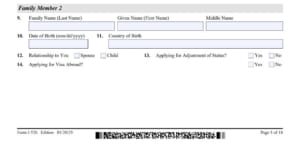 The United States Department of State (“DOS”) is scheduled to release new guidelines giving consular officers further discretion to determine whether women who are applying for a B-1/ B-2 visitor visa primary purpose is to give birth in the United States. It is unclear how consular officers at U.S. Embassies and Consulates will make that determination and whether they will attempt to verify pregnancies.
The United States Department of State (“DOS”) is scheduled to release new guidelines giving consular officers further discretion to determine whether women who are applying for a B-1/ B-2 visitor visa primary purpose is to give birth in the United States. It is unclear how consular officers at U.S. Embassies and Consulates will make that determination and whether they will attempt to verify pregnancies.
The revised guidelines which are expected to appear shortly in the Federal Register is the latest move by the Trump Administration to discourage birth tourism. The White House has previously voiced concern that pregnant women are coming to the United States to give birth and claim U.S. citizenship for their children. Currently, consular officers use their judgment when screening visa applicants and do not ask every woman applying for a visa if they are pregnant.
“Under this rule, if a consular officer has reason to believe that a B nonimmigrant visa applicant will give birth in the United States, the applicant is presumed to be seeking a visa for the primary purpose of obtaining U.S. citizenship for the child,” the proposed rule states. “To rebut this presumption, the visa applicant must establish to the satisfaction of a consular officer a legitimate purpose other than obtaining U.S. citizenship for the child.”
The proposed language would alter the current guidelines on issuing B visas to pregnant women.
“Any B nonimmigrant visa applicant who you have reason to believe will give birth during her stay in the United States is presumed to be traveling for the primary purpose of obtaining US citizenship for the child. The applicant can overcome this presumption if you find that the primary purpose is not obtaining US citizenship for the child.”
According to the Center for Immigration Studies, there are an estimated 33,000 births per year to women who arrived in the United States on a B visitor visa and departed the country after giving birth.
For more information about these new guidelines from the United States Department of State, please contact us at:




